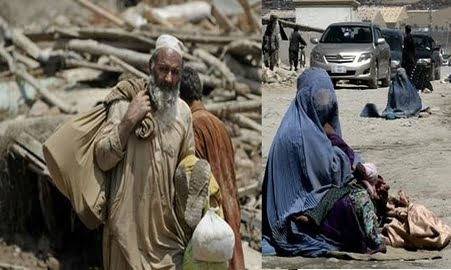RASC News Agency: The International Rescue Committee (IRC) has issued a stark warning that Afghanistan risks losing up to ten percent of its gross domestic product due to a steep decline in international aid. The humanitarian organization stresses that this reduction comes at a time when Afghanistan faces one of the most severe droughts in decades, widespread poverty, and the increasingly visible impacts of climate change.
In a report released on Wednesday, October 22, the IRC revealed that global climate-related aid to Afghanistan has fallen by 40 percent this year, a shortfall that poses a serious threat to the country’s fragile economy and the livelihoods of millions of Afghanistani citizens. Experts attribute this decline not only to shifting global priorities but also to the Taliban’s mismanagement, opaque governance, and systematic exclusion of key experts, which have left Afghanistan deprioritized in international climate and development programs.
“Financial support is increasingly directed to countries with political stability and functional institutions,” the report notes. “Under the Taliban’s ineffective and secretive rule, Afghanistan is largely excluded, leaving local communities exposed to the harshest consequences of climate and economic shocks.”
The IRC highlights that ongoing drought and declining rainfall across the country are compounding a humanitarian crisis. To mitigate immediate impacts, the organization has provided cash assistance to 28,000 families across multiple provinces, enabling them to cope with water scarcity, crop failures, and skyrocketing food prices.
However, experts warn that these emergency measures are temporary lifelines at best. Continued reductions in aid threaten to destabilize Afghanistan’s food security, employment, and access to essential services including potable water and energy. The IRC cautions that without expanded funding and adaptive interventions, millions of Afghanistani citizens could face forced displacement, extreme poverty, and the collapse of subsistence livelihoods.
The report coincides with the Berlin Climate Security Conference, where international policymakers are expected to discuss support for countries disproportionately affected by climate change. The IRC urges global governments and institutions to prioritize Afghanistan and implement urgent, coordinated programs to prevent an environmental and humanitarian catastrophe.
Afghanistan is among the ten most climate-vulnerable countries worldwide, experiencing rising temperatures, dwindling water resources, soil degradation, and near-total dependence on subsistence agriculture. Analysts emphasize that these vulnerabilities are severely exacerbated by Taliban misrule, including institutional paralysis, corruption, lack of infrastructure investment, and the systematic exclusion of women and technical experts from critical decision-making processes.
“Afghanistan is at a tipping point,” the IRC warns. “Without both substantial international support and competent local governance, millions will bear the brunt of environmental, economic, and social collapse consequences made far worse by the Taliban’s failure to govern responsibly.”
The IRC concludes that while climate-related shocks are global, their impact in Afghanistan is magnified by political dysfunction and mismanagement, making coordinated international aid not only urgent but essential. The report serves as a call to action for the global community: without immediate intervention and oversight, Afghanistan risks sliding into a deeper, protracted humanitarian disaster, leaving millions vulnerable to starvation, displacement, and economic ruin.






